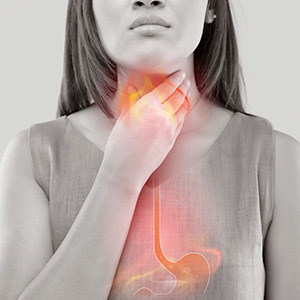
GERD is a condition that affects the digestive system. GERD is short for Gastroesophageal Reflux Disease, which means it's all about acid reflux from the stomach into the esophagus. Its symptoms are caused by acid backing up from your stomach and irritating your esophagus or throat. Gastroesophageal Reflux Disease can be cured.
What causes GERD?
GERD is most commonly caused by a weak valve or sphincter muscle at the stomach entrance. Stomach acid can flow back up into your esophagus when this muscle doesn't close properly. Other causes of it include smoking, being overweight, and pregnancy.
What are the GERD symptoms?
The most common Gastroesophageal Reflux Disease symptoms include:
- Heartburn: A burning feeling in your chest that often occurs after eating
- Regurgitation: The sensation of acid or food coming back up your throat
- Dysphagia: Difficulty swallowing
- Chest pain
Other, less common symptoms include:
- A sour taste in your mouth
- Bad breath
- Coughing or wheezing
- Hoarseness
GERD symptoms can be worse when you lie down or bend over.
How is GERD diagnosed?
Your doctor will likely diagnose GERD if you have symptoms and they are consistent with Gastroesophageal Reflux Disease. Your doctor may order tests such as an upper endoscopy or an esophageal pH test to confirm the diagnosis.
Can Gastroesophageal Reflux Disease be cured?
Yes, GERD can be cured. The most common treatment for Gastroesophageal Reflux Disease is medication, which can help to decrease the amount of acid in your stomach. If lifestyle changes don't help, your doctor may also recommend surgery.
Treatment for Gastroesophageal Reflux Disease
There are many treatments for GERD. You may need to try a few before finding the one that works best for you.
- Lifestyle changes: Making changes to your lifestyle can help reduce its symptoms. This includes losing weight if you are overweight, quitting smoking, and avoiding caffeine and alcohol.
- Medications: Many different medications can be used to treat it. These include proton pump inhibitors (PPIs), H2 blockers, and antacids.
- Surgery: In some cases, surgery may be recommended to treat GERD. This is typically only recommended if other treatments haven't worked.
Gastroesophageal Reflux Disease can be a chronic condition, but it can be controlled. With treatment, you can live every day and healthy life.
Cure for Gastroesophageal Reflux Disease
GERD symptoms can be worse when you lie down or bend over. The most common GERD symptoms include heartburn, regurgitation, dysphagia, and chest pain. It can also cause other, less common symptoms. These include a sour taste in your mouth, bad breath, coughing or wheezing, and hoarseness.
Your symptoms and medical history diagnose GERD. Your doctor may also order tests such as an upper endoscopy or an esophageal pH test to confirm the diagnosis.
It's treated with lifestyle changes, medication, or surgery. Gastroesophageal Reflux Disease can be a chronic condition, but it can be controlled. With treatment, you can live a normal and healthy.
How to prevent GERD?
There are many ways to prevent GERD. The most effective way to prevent it is to make lifestyle changes. This includes losing weight if you are overweight, quitting smoking, and avoiding caffeine and alcohol.
You can also reduce your GERD symptoms by avoiding trigger foods. These include acidic and spicy foods, as well as carbonated drinks.
Conclusion
GERD is a condition that affects many people and can be treated in various ways. The most common treatment for it is medication, which can help to decrease the amount of acid in your stomach. With treatment, you can live every day and have a healthy life. If lifestyle changes don't help, your doctor may also recommend surgery.
